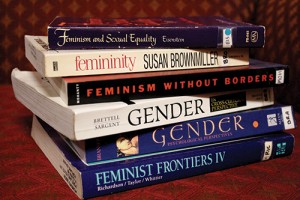Most of us have heard about Romney’s “binders full of women” and seen the data proving Romney didn’t actually compile said binders and, furthermore, that his record of hiring women was actually quite poor.
Feminism: conservatives’ dirtiest word
Most of us have heard about Romney’s “binders full of women” and seen the data proving Romney didn’t actually compile said binders and, furthermore, that his record of hiring women was actually quite poor.
It isn’t like that was anywhere near the biggest lie he told at the debates.
What about the woman who first asked the question about workplace inequalities? Not much has been said about her.
Katherine Fenton is a teacher and undecided voter who believes in “women’s equality in the workplace” and said she’s “protective of [her] reproductive rights.” She’s worried about the economy and is grateful that she was able to stay on her parents’ health insurance thanks to the Affordable Care Act.
She’s also been widely attacked by conservatives, and slut-shamed for posts on her Twitter feed indicating she enjoys the occasional drink. All things considered, she resembles the typical female voter.
Oh, and one last thing: She’s publicly declared she’s “absolutely not” a feminist. She said, “I’m a 24-year-old woman that lives in the United States and feels like I should be treated the same as anyone else. That makes me a normal human being.”
I’ve heard the same thing in classes here. Even in women’s studies classes or in response to lectures on feminism, women begin comments by saying, “Well, I’m not a feminist, but…” And it’s not just at Portland State—recent data suggests 71 percent of women don’t self-identify as feminists.
Do self-hatred and internalized sexism really go that deep?
These women frustrate me. They sure seem to think they ought to have the right to get an education, to vote, to sit at a table alongside men, to wear what they want, to earn equal pay for equal work and, most importantly, to express their own unique opinions.
At the very least, I wish they’d realize that by disavowing feminism they’ve failed to recognize that they stand on the backs of giants who fought hard-won battles for their right to have a voice—the same voice they now use to rail against feminism.
We should thank early feminists for so many things: parental rights after a divorce, birth control and the ability to own property, drive a car or consent to sex.
Feminism means you believe in equality for all genders. It ought to be a pretty simple concept, and while I have some criticisms of the feminist movement, the basic tenet—that women deserve equality—has not changed.
Caitlin Moran, a very funny albeit occasionally problematic feminist, has a great response to women who rush to separate themselves from feminism. She points out in her book How To Be a Woman:
“Here is a quick way of working out if you’re a feminist. Put your hand in your underpants.
a. Do you have a vagina? And
b. Do you want to be in charge of it?
If you said ‘yes’ to both, then congratulations! You’re a feminist.”
While Moran’s definition is limiting—genitalia doesn’t always determine gender and you don’t need to self-identify as female to be a feminist—the image she conjures serves as an apt response to women who disavow feminism.
Fenton’s declaration certainly seems to indicate a skewed definition of the term, since she implies feminism has nothing to do with equality and is something abnormal.
That’s the most frustrating part. Many in our society have worked very hard to make feminism a dirty word. You’ve all heard the negative descriptions—ranging from hairy, man-hating beasts to slutty, birth-control-using whores—that many people choose to believe. The consequences are astounding.
When a woman asked a question about equal pay at a presidential debate, even though she was quick to separate herself from feminism, she was still harassed for being a “party girl” and was called names like “feminazi.”
It’s exactly because of this negative treatment that we still need feminism.
Everyone—of any gender—needs to think before rushing to be separated from “feminism.” Declaring you aren’t a feminist merely cedes power to a conservative movement that’s spent the last 40 years trying to make feminism a bad word.
I’d like to echo a few other feminists who, after Fenton’s claim, merely smiled and said, “I’ll still fight for her rights, even if she doesn’t think she needs me to.”









Many people, in response to this issue, would be quick to define themselves as egalitarian instead of feminist, which it seems Katherine Fenton has basically done. While I like the principles of egalitarianism, I dislike that it’s replacing feminism (what a dirty, dirty word!) as a more p.c. option. I dislike that “feminism” is being dragged through the dirt when it’s a perfectly suitable, if misconstrued, option for a very important human principle. So what can we all do to turn this around on the feminist-haters/misunderstanders (that’s not a real word)? I’d take a look at the recent trend of re-labeling pro-life advocates as anti-choice, and maybe use that as a great starting example.
This is also why I believe in taking back words such as “cunt” or “slut” that are, 95% of the time, used negatively. They aren’t going to go away, so we may as well try to turn them around.
Thank you for posting! We must try to lift the veil of ignorance about what feminism truly is.